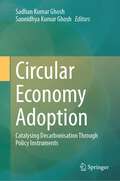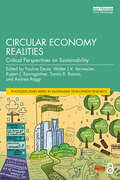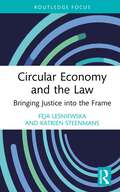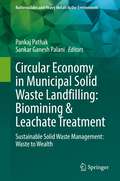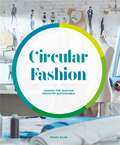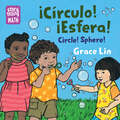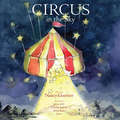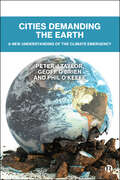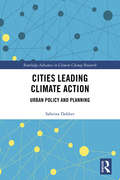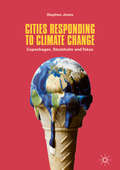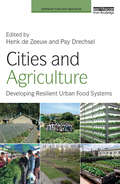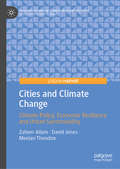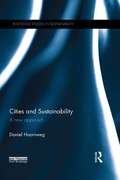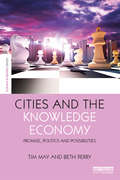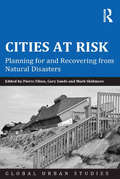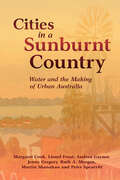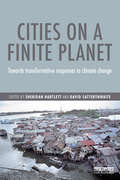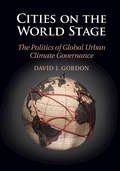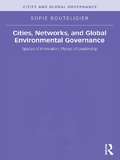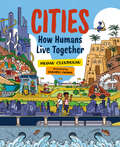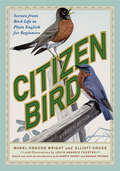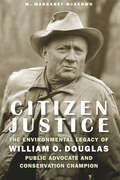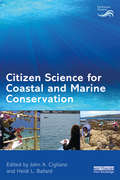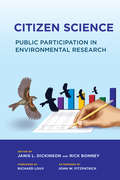- Table View
- List View
Circular Economy Adoption: Catalysing Decarbonisation Through Policy Instruments
by Sadhan Kumar Ghosh Sannidhya Kumar GhoshThis edited book brings out a comprehensive collection of information on principle and policy of circular economy. It deals with the general principles, pathways of circular economic development in different countries, use of circular economy in achieving sustainable development goals. The book covers policy instruments that helps implementing resource efficient processes, strategies of implementing circular economy concepts, Decarbonisation, and developing business promoting circular economy principles. The circular economy has gained increasing prominence as a tool which presents solutions to some of the world’s most pressing sustainable development challenges. By addressing root causes, the concept of a circular economy, an economy in which waste and pollution do not exist by design, products and materials are kept in use, and natural systems are regenerated provides promise to achieving SDGs. This book is of interest and use to practitioners, capacity builders and policymakers, entrepreneurs, NGOs, general people, and valuable source of reference to the relevant researchers and students in global markets. As circular economy is gaining momentum and interest in general, the book serves as reading material for undergraduate and graduate students in any field specifically environmental science, waste management, medical science as well as environmental management at national and international level.
Circular Economy Realities: Critical Perspectives on Sustainability (Routledge/ISDRS Series in Sustainable Development Research)
by Andrea Raggi Pauline Deutz Vermeulen, Walter J.V. Rupert J. Baumgartner Tomás B. RamosThis book addresses the realities of the circular economy, a resource efficiency concept that has risen to global prominence in academic, policy and business circles over the last decade. Considered an approach to sustainable growth, the volume critically analyses how sustainable emerging applications of a circular economy are in practice.The book stems from an international, interdisciplinary project exploring the discourses, policies, implementation and impacts of the circular economy across public, private and third sector accounts. It draws on a wide range of case studies, from the UK, Portugal, Austria, Italy, the Netherlands, France, Chile, China, Nigeria, Taiwan and Vietnam, highlighting how experiences both shaped and were shaped by the places in which they were happening. It provides a guide to researching a complex phenomenon such as a circular economy, which involves both collaboration and competition between multiple stakeholders across different sectors and places. Synthesising the multiple perspectives employed in the project, the book makes recommendations for circular economy implementation in different contexts, including the assessment of sustainability implications, whilst indicating the limited potential for circular economy activity to bring social and economic benefits without explicit motivation for those to happen.Benefitting from extensive empirical research, this critical assessment of sustainability in the context of the circular economy will appeal to a broad readership of academics, upper-level students, practitioners and policy-makers in sustainable development, business, economics, geography, sociology and environmental engineering.The Open Access version of this book, available at http://www.taylorfrancis.com, has been made available under a Creative Commons Attribution-Non Commercial-No Derivatives (CC-BY-NC-ND) 4.0 license.
Circular Economy and the Law: Bringing Justice into the Frame (Routledge Focus on Environment and Sustainability)
by Feja Lesniewska Katrien SteenmansThis book explores the role of law and policy in circular economy transitions and their impacts on justice, including on distributional equity and recognition and procedural rights, especially for people already marginalised under the current dominant economic system. Amid increasing demand for virgin raw materials, and unsustainable consumption and waste disposal that are driving the global ecological and climate crisis, there are growing calls to urgently transition to circular economies. Despite an increasing number of circular approaches being adopted, implemented, and integrated in national and local laws and policies, the number of commercially successful business stories remains isolated. Moreover, questions about whether circular economy laws and policies are delivering fair and just global outcomes need to be addressed. This book examines this significant knowledge gap to understand legal experiences, including justice and equity issues in the global context, so that these can inform wider design and implementation. The book begins by explaining the concept of a circular economy and its context within wider issues of sustainable development and justice. The first part of the book then examines the legal context of the circular economy by analysing legal forms in practice and those recommended in wider scholarship before considering how these could impact on existing inequity and injustices globally. The second part delivers an empirical understanding of the implications of the law on circular economy approaches and the global equity and justice dimensions through two case studies on solid waste management and forestry. The final part addresses legal opportunities and challenges for wider implementation of circular economy approaches that incorporate justice into its framing. This book will be of great interest to students, scholars, and practitioners of environmental and natural resource law and policy, circular economy, industrial ecology, natural resource management, and sustainable development more broadly.
Circular Economy in Municipal Solid Waste Landfilling: Sustainable Solid Waste Management: Waste to Wealth (Radionuclides and Heavy Metals in the Environment)
by Pankaj Pathak Sankar Ganesh PalaniThis book will serve as a ready reckoner of contemporary information regarding municipal solid waste landfill biomining, treatment of landfill leachate and heavy metals in a single platform. The academicians, researchers, and students at master’s and doctoral levels will be able to understand the current trends in municipal solid waste landfill operations, which will help in augmenting their research. Construction of new landfills requires huge monetary investments, which can be avoided if old landfills were bio-mined for resources and the space can be re-used as new landfills. Landfill leachate is a hazardous waste which needs proper treatment that could generate value-added products such as clean energy and biofertilizers. In this book, each chapter would provide the background, methodology, and relevant calculations for sustaining landfill operations. Also, the case studies based on best practices in municipal solid waste landfilling are discussed in this book.
Circular Fashion: Making the Fashion Industry Sustainable
by Peggy BlumCreating sustainable fashion has never been more important. Circular Fashion provides an accessible, practical, and holistic approach to this key topic for anyone studying fashion.This introductory text to sustainability in fashion includes best practice case studies and profiles of key companies such as Patagonia, Veja, Christopher Raeburn, and Stella McCartney. It begins with an overview of the fashion business, tackling the issues of the linear production model of make, use, dispose, before introducing the idea of the circular supply chain.Circular Fashion is the must-have book for fashion students, creatives and anyone passionate about sustainability and fashion.
Circular Fashion: Making the Fashion Industry Sustainable
by Peggy BlumCreating sustainable fashion has never been more important. Circular Fashion provides an accessible, practical, and holistic approach to this key topic for anyone studying fashion.This introductory text to sustainability in fashion includes best practice case studies and profiles of key companies such as Patagonia, Veja, Christopher Raeburn, and Stella McCartney. It begins with an overview of the fashion business, tackling the issues of the linear production model of make, use, dispose, before introducing the idea of the circular supply chain.Circular Fashion is the must-have book for fashion students, creatives and anyone passionate about sustainability and fashion.
Circulo! Esfera! / Circle! Sphere! (Storytelling Math)
by Grace LinNow in Spanish bilingual editions--Caldecott Honor winner Grace Lin celebrates math for every kid in this board book series.Manny and his friends Olivia and Mei blow bubbles in this playful introduction to geometry. Manny's wand is a circle. Olivia's wand is a square. Mei's wand is a heart. What shape will their bubbles be? (Surprise! They're all spheres.)The Storytelling Math series shows that all children can be mathematical thinkers. Each book includes ideas for exploring math at home with your children, developed in collaboration with math experts at STEM education nonprofit TERC Inc., under a grant from the Heising-Simons Foundation.
Circus in the Sky
by Nancy Guettier“A story that illustrates the constellations in a new and beautiful way” from the author of Mermaids on Mars and Jude’s Moon (Making Them Readers). Circus in the Sky is a gorgeously illustrated tale of a little boy who believes he is the ringmaster of the night sky. Poetic and magical, it will inspire parents and kids to want to learn more of the universe and its wonders. “This little gem is a delightfully entertaining read. Julian dreams he is the ringleader of the constellations in Circus in the Sky. He discovers Leo the Lion, the Gemini twins and the rest of the sky’s 88 constellations.” —MySocialGoodNews.com “A wonderful lesson of the constellations in our night sky. The story is told through the imagination of a young boy named Julian as he dreams he is the ringleader of a circus in the sky. As the tent floats among the stars the various famous constellations are introduced. Constellations like Orion the Mighty Hunter, Ursa Major and Ursa Minor and the seven sisters.” —Observations from a Simple Life
Cities Demanding the Earth: A New Understanding of the Climate Emergency
by Peter Taylor Geoff O'BrienThis urgent book brings our cities to the fore in understanding the human input into climate change. The demands we are making on nature by living in cities has reached a crisis point and unless we make significant changes to address it, the prognosis is terminal consumption. Providing a radical new argument that integrates global understandings of making nature and making cities, the authors move beyond current policies of mitigation and adaption and pose the challenge of urban stewardship to tackle the crisis. Their new way of thinking re-orients possibilities for environmental policy and calls for us to reinvent our cities as spaces for activism.
Cities Leading Climate Action: Urban Policy and Planning (Routledge Advances in Climate Change Research)
by Sabrina DekkerThis book provides local governments and interested stakeholders with insights into the challenges and opportunities inherent in addressing climate change. Drawing on in-depth case study research on Vancouver, Portland, Glasgow and Dublin, Dekker examines the policy development processes employed by urban policy makers to respond to climate change, looking specifically at the utilisation of collaborative planning. Emerging from the case studies are lessons for local governments in relation to the role of organisational structure in supporting climate leadership; the importance of leadership, trust, relationship building and narratives for supporting ownership of the responses to climate change by stakeholders; and the need for creative and innovative public engagement to expand the reach of traditional methods such as social media and other technology-based solutions. Finally, Dekker reflects on her experience in the development of climate change action plans for the Dublin Local Authorities. This book will be of great relevance to students, scholars and policy makers with an interest in climate change resilience, environmental policy and urban planning.
Cities Responding to Climate Change: Copenhagen, Stockholm and Tokyo
by Stephen JonesThis book explores the climate policy approaches established by various city governments. It details the strategies, plans and initiatives that have so far been designed to both mitigate and adapt to the impacts of global warming. In doing so, it considers the implications of the actions taken by leading cities and its effects on underlying theoretical assumptions relating to policy development and management processes in achieving climate policy outcomes. Cities Responding to Climate Change establishes an analytical framework that critically examines the application of performance management by city governments in their policy responses to climate change. It draws its focus on the city governments of Copenhagen, Stockholm and Tokyo to bring together and discuss the concepts, strategies and practices that have since been introduced to respond to the climate challenges faced. This book highlights the lessons to be learned by other city governments around the world contemplating serious action with climate policies to lessen the impacts of global warming. It will be of particular interest to practitioners and researchers seeking evidence of how governments deliver on their commitments and improve their effectiveness in implementing climate polices.
Cities and Agriculture: Developing Resilient Urban Food Systems (Earthscan Food and Agriculture)
by Pay Drechsel Henk De ZeeuwAs people increasingly migrate to urban settings and more than half of the world's population now lives in cities, it is vital to plan and provide for sustainable and resilient food systems which reflect this challenge. This volume presents experience and evidence-based "state of the art" chapters on the key dimensions of urban food challenges and types of intra- and peri-urban agriculture. The book provides urban planners, local policy makers and urban development practitioners with an overview of crucial aspects of urban food systems based on an up to date review of research results and practical experiences in both developed and developing countries. By doing so, the international team of authors provides a balanced textbook for students of the growing number of courses on sustainable agriculture, food and urban studies, as well as a solid basis for well-informed policy making, planning and implementation regarding the development of sustainable, resilient and just urban food systems.
Cities and Climate Change: Climate Policy, Economic Resilience and Urban Sustainability (Palgrave Studies in Climate Resilient Societies)
by David Jones Zaheer Allam Meelan ThondooThis book explores climate change responsiveness policies for cities and discusses why they have been slow to gain traction despite having been on the international agenda for the last 30 years. The contributing role of cities in accentuating the effects of climate change is increasingly demonstrated in the literature, underscoring the unsustainable models on which urban life has been made to thrive. As these issues become increasingly apparent, there are global calls to adopt more sustainable and equitable models, however doing so will mean the disruption of economies that have historically relied upon pollution-generating industries. In order to address these issues the authors examine them from a cross-disciplinary perspective, bringing in regional, local and urban standpoints to subsequently propose an alternative short-term economic model that could accelerate the adoption of climate change mitigation infrastructures and urban sustainability in urban areas. This book will be of particular value to scholars and students alike in the field of urbanism, sustainability and resilience, as well as practitioners looking at avenues for economically incentivizing sustainable development in various geographical context.
Cities and Sustainability: A new approach (Routledge Studies in Sustainability)
by Daniel HoornwegCities are the most likely actors to design and bring about lasting sustainability. An agreement among the world’s larger cities is possible, and likely a necessary but insufficient condition to achieve sustainable development. Cities and Sustainability explores the ways in which cities are both the biggest threat to sustainability, and the most powerful tool to get us to sustainable development. Employing an innovative methodology to a complex issue, the book proposes new metrics and approaches that assume cities as fundamental in the search for sustainability. Providing population projections for the world’s larger cities and a hierarchy of sustainable cities, the author develops two new tools: (i) a cities approach to physical and socio-economic boundaries, and (ii) sustainability costs curves. These tools are designed to be implemented in a multi-stakeholder, integrated partnership that truly maximizes the benefits of cities in the quest for sustainability. Applying the tools outlined in the book to case studies from Dakar, Mumbai, Sao Paulo, Shanghai and Toronto, this volume will be of great relevance to students, scholars and practitioners with an interest in urban and city management, climate change, and environment and sustainability more broadly.
Cities and the Knowledge Economy: Promise, Politics and Possibilities (The Earthscan Science in Society Series)
by Beth Perry Tim MayCities and the Knowledge Economy is an in-depth, interdisciplinary, international and comparative examination of the relationship between knowledge and urban development in the contemporary era. Through the lenses of promise, politics and possibility, it examines how the knowledge economy has arisen, how different cities have sought to realise its potential, how universities play a role in its realisation and, overall, what this reveals about the relationship between politics, capitalism, space, place and knowledge in cities. The book argues that the 21st century city has been predicated on particular circuits of knowledge that constitute expertise as residing in elite and professional epistemic communities. In contrast, alternative conceptions of the knowledge society are founded on assumptions which take analysis, deliberation, democracy and the role of the citizen and communities of practice seriously. Drawing on a range of examples from cities around the world, the book reflects on these possibilities and asks what roles the practice of ‘active intermediation’, the university and a critical and engaged social scientific practice can all play in this process. The book is aimed at researchers and students from different disciplines – geography, politics, sociology, business studies, economics and planning – with interests in contemporary urbanism and the role of knowledge in understanding development, as well as urban policymakers, politicians and practitioners who are concerned with the future of our cities and seek to create coalitions of different communities oriented towards more just and sustainable futures.
Cities at Risk: Planning for and Recovering from Natural Disasters (Global Urban Studies)
by Gary Sands Pierre FilionAs levels of urbanization increase around the world, the growing concentrations of population and economic activity increases vulnerability to natural disasters. Interdependencies among urban populations mean that damage to the built environment, including water, sewer and energy infrastructure, can affect millions. Even if there is no change in the rate of occurrence of natural disasters (an unlikely prospect in the face of ongoing climate change) the potential for human and economic loss will continue to increase, along with the time required to recover. How do cities prepare for and recover from natural disasters? In this book, the authors provide a broad overview of the issues related to the impacts of disasters on cities around the world, from assessing risks to accounting for damages. The comparative approach across different types of disasters in a range of urban locations is useful in identifying opportunities for policy transfer. While there is no ’one size fits all’ solution to hazard mitigation, valuable lessons can be learned from the experiences of others. The chapters emphasize different modes for assessing hazard risk, as well as strategies for increasing the resiliency of vulnerable populations.
Cities in a Sunburnt Country: Water and the Making of Urban Australia (Studies in Environment and History)
by Martin Shanahan Lionel Frost Margaret Cook Andrea Gaynor Jenny Gregory Ruth A. Morgan Peter SpearrittAs Australian cities face uncertain water futures, what insights can the history of Aboriginal and settler relationships with water yield? Residents have come to expect reliable, safe, and cheap water, but natural limits and the costs of maintaining and expanding water networks are at odds with forms and cultures of urban water use. Cities in a Sunburnt Country is the first comparative study of the provision, use, and social impact of water and water infrastructure in Australia's five largest cities. Drawing on environmental, urban, and economic history, this co-authored book challenges widely held assumptions, both in Australia and around the world, about water management, consumption, and sustainability. From the 'living water' of Aboriginal cultures to the rise of networked water infrastructure, the book invites us to take a long view of how water has shaped our cities, and how urban water systems and cultures might weather a warming world.
Cities on a Finite Planet: Towards transformative responses to climate change
by David Satterthwaite Sheridan BartlettCities on a Finite Planet: Transformative responses to climate change shows how cities can combine high quality living conditions, resilience to climate change, disaster risk reduction and contributions to mitigation/low carbon development. It also covers the current and potential contribution of cities to avoiding dangerous climate change and is the first book with an in-depth coverage of how cities and their governments, citizens and civil society organizations can combine these different agendas, based on careful city-level analyses. The foundation for the book is detailed city case studies on Bangalore, Bangkok, Dar es Salaam, Durban, London, Manizales, Mexico City, New York and Rosario. Each of these was led by authors who contributed to the IPCC’s Fifth Assessment and are thus acknowledged as among the world’s top specialists in this field. This book highlights where there is innovation and progress in cities and how this was achieved. Also where there is little progress and no action and where there is no capacity to act. It also assesses the extent to which cities can address the Sustainable Development Goals within commitments to also dramatically reduce greenhouse gas emissions. In this, it highlights how much progress on these different agendas depends on local governments and their capacities to work with their low-income populations.
Cities on the World Stage: The Politics of Global Urban Climate Governance
by David J. GordonCities are playing an ever more important role in the mitigation and adaption to climate change. This book examines the politics shaping whether, how and to what extent cities engage in global climate governance. By studying the C40 Cities Climate Leadership Group, and drawing on scholarship from international relations, social movements, global governance and field theory, the book introduces a theory of global urban governance fields. This theory links observed increases in city engagement and coordination to the convergence of C40 cities around particular ways of understanding and enforcing climate governance. The collective capacity of cities to produce effective and socially equitable global climate governance is also analysed. Highlighting the constraints facing city networks and the potential pitfalls associated with a city-driven global response, this assessment of the transformative potential of cities will be of great interest to researchers, graduate students and policymakers in global environmental politics and policy.
Cities, Networks, and Global Environmental Governance: Spaces of Innovation, Places of Leadership (Cities and Global Governance)
by Sofie BouteligierAs a result of global dynamics—the increasing interconnection of people and places—innovations in global environmental governance haved altered the role of cities in shaping the future of the planet. This book is a timely study of the importance of these social transformations in our increasingly global and increasingly urban world. Through analysis of transnational municipal networks, such as Metropolis and the C40 Cities Climate Leadership Group, Sofie Bouteligier's innovative study examines theories of the network society and global cities from a global ecology perspective. Through direct observation and interviews and using two types of city networks that have been treated separately in the literature, she discovers the structure and logic pertaining to office networks of environmental non-governmental organizations and environmental consultancy firms. In doing so she incisively demonstrates the ways in which cities fulfill the role of strategic sites of global environmental governance, concentrating knowledge, infrastructure, and institutions vital to the function of transnational actors.
Cities: How Humans Live Together (Orca Timeline #3)
by Megan ClendenanKey Selling Points Cities takes readers on a journey to more than 75 cities on six continents. It explores what makes a city sustainable and welcoming for today and tomorrow by introducing critical questions around urban citizenship, inclusivity and environmental and social justice. Includes fun and age-appropriate facts about public toilets, what cities used to look like and more. Links to numerous curriculum themes and has been vetted by experts in history, urban planning and environmental urban policy. Asks readers to think critically about how and why cities have evolved the way they have and how that should inform the cities of the future. The author did her graduate studies in environmental urban planning.
Citizen Bird: Scenes from Bird-Life in Plain English for Beginners, A Critical Edition
by Elliott Coues Mabel Osgood Wright Elliot CouesIn the late nineteenth century, American bird lovers faced a crisis. Bird species were becoming endangered or even extinct at an alarming rate, and old methods of hunting and collecting specimens accelerated the process. A new conservationist approach to birding was necessary, and it needed to be taught to the next generation of Americans. Thus 1897’s Citizen Bird, the first birding guide for children, was born. A tremendously influential text in the Progressive-era United States, it inspired in a generation of schoolchildren a love of wild birds and the desire to protect them. Born of a collaboration between naturalist Mabel Osgood Wright, ornithologist Elliott Coues, and bird artist Louis Agassiz Fuertes, the book is vital to the history of birding and the broader study of nineteenth-century American culture and literature. This new edition of Citizen Bird preserves the original book’s 111 drawings and adds explanatory footnotes, supplemental historical material, and a new introduction. More than a century and a quarter after its original publication, Elizabeth Cherry and Meghan Freeman contextualize the book in the tradition and history of birding and discuss the roles of its authors and illustrator in birding history. A landmark text in the history of American conservationism, Citizen Bird is a timeless classic that will bring joy to birdwatchers of all ages.
Citizen Justice: The Environmental Legacy of William O. Douglas—Public Advocate and Conservation Champion
by Hon. M. Margaret McKeownU.S. Supreme Court Justice William O. Douglas was a giant in the legal world, even if he is often remembered for his four wives, as a potential vice-presidential nominee, as a target of impeachment proceedings, and for his tenure as the longest-serving justice from 1939 to 1975. His most enduring legacy, however, is perhaps his advocacy for the environment. Douglas was the spiritual heir to early twentieth-century conservation pioneers such as Teddy Roosevelt and John Muir. His personal spiritual mantra embraced nature as a place of solitude, sanctuary, and refuge. Caught in the giant expansion of America&’s urban and transportation infrastructure after World War II, Douglas became a powerful leader in forging the ambitious goals of today&’s environmental movement. And, in doing so, Douglas became a true citizen justice. In a way unthinkable today, Douglas ran a one-man lobby shop from his chambers at the U.S. Supreme Court, bringing him admiration from allies in conservation groups but raising ethical issues with his colleagues. He became a national figure through his books, articles, and speeches warning against environmental dangers. Douglas organized protest hikes to leverage his position as a national icon, he lobbied politicians and policymakers privately about everything from logging to highway construction and pollution, and he protested at the Supreme Court through his voluminous and passionate dissents. Douglas made a lasting contribution to both the physical environment and environmental law—with trees still standing, dams unbuilt, and beaches protected as a result of his work. His merged roles as citizen advocate and justice also put him squarely in the center of ethical dilemmas that he never fully resolved. Citizen Justice elucidates the why and how of these tensions and their contemporary lessons against the backdrop of Douglas&’s unparalleled commitment to the environment.
Citizen Science for Coastal and Marine Conservation (Earthscan Oceans)
by John A. Cigliano Heidi L. BallardIn recent years, citizen science has emerged as a powerful new concept to enable the general public, students, and volunteers to become involved in scientific research. A prime example is in biodiversity conservation, where data collection and monitoring can be greatly enhanced through citizen participation. This is the first book to provide much needed guidance and case studies from marine and coastal conservation. The novelty and rapid expansion of the field has created a demand for the discussion of key issues and the development of best practices. The book demonstrates the utility and feasibility, as well as limitations, of using marine and coastal citizen science for conservation, and by providing critical considerations (i.e.which questions and systems are best suited for citizen science), presents recommendations for best practices for successful marine and coastal citizen science projects. A range of case studies, for example, on monitoring of seabird populations, invasive species, plastics pollution, and the impacts of climate change, from different parts of the world, is included. Also included are discussions on engaging youth, indigenous communities, and divers and snorkelers as citizen scientists, as well as best practices on communication within citizen science, building trust with stakeholders, and informing marine policy as part of this exciting and empowering way of improving marine and coastal conservation. .
Citizen Science: Public Participation in Environmental Research
by Richard Louv John W. Fitzpatrick Janis L. Dickinson Rick BonneyCitizen science enlists members of the public to make and record useful observations, such as counting birds in their backyards, watching for the first budding leaf in spring, or measuring local snowfall. The large numbers of volunteers who participate in projects such as Project FeederWatch or Project BudBurst collect valuable research data, which, when pooled together, create an enormous body of scientific data on a vast geographic scale. In return, such projects aim to increase participants' connections to science, place, and nature, while supporting science literacy and environmental stewardship. In Citizen Science, experts from a variety of disciplines-including scientists and education specialists working at the Cornell Lab of Ornithology, where many large citizen science programs use birds as proxies for biodiversity-share their experiences of creating and implementing successful citizen science projects, primarily those that use massive data sets gathered by citizen scientists to better understand the impact of environmental change.This first and foundational book for this developing field of inquiry addresses basic aspects of how to conduct citizen science projects, including goal-setting, program design, and evaluation, as well as the nuances of creating a robust digital infrastructure and recruiting a large participant base through communications and marketing. An overview of the types of research approaches and techniques demonstrates how to make use of large data sets arising from citizen science projects. A final section focuses on citizen science's impacts and its broad connections to understanding the human dimensions and educational aspects of participation. Citizen Science teaches teams of program developers and researchers how to cross the bridge from success at public engagement to using citizen science data to understand patterns and trends or to test hypotheses about how ecological processes respond to change at large geographic scales. Intended as a resource for a broad audience of experts and practitioners in natural sciences, information science, and social sciences, this book can be used to better understand how to improve existing programs, develop new ones, and make better use of the data resources that have accumulated from citizen science efforts. Its focus on harnessing the impact of "crowdsourcing" for scientific and educational endeavors is applicable to a wide range of fields, especially those that touch on the importance of massive collaboration aimed at understanding and conserving what we can of the natural world.
